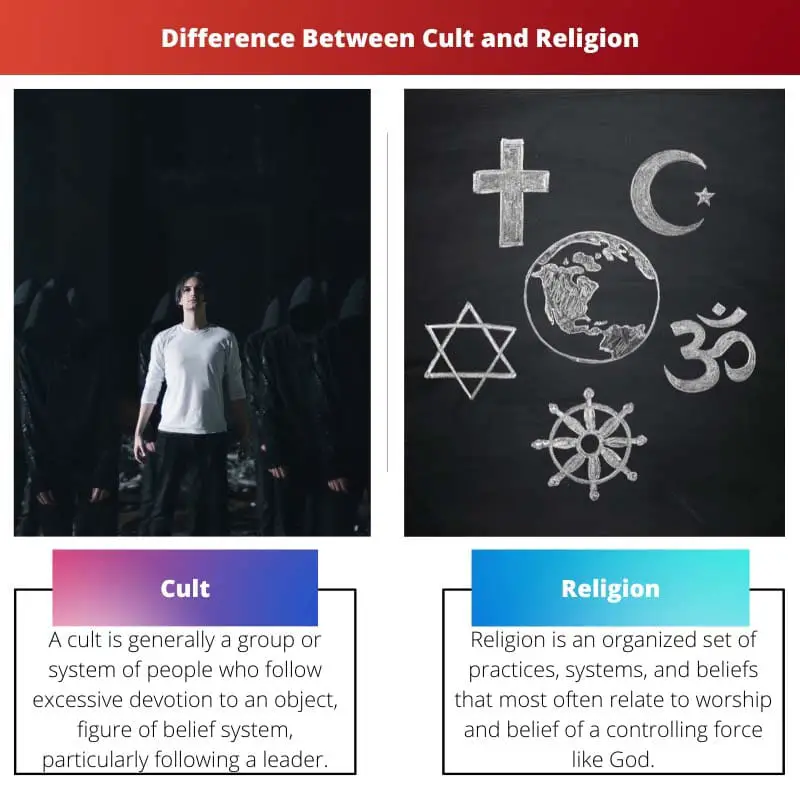Introduction:
The words “cult” and “religion” are often used interchangeably, but there are significant differences between the two. In an era marked by spiritual exploration and the rise of new religious movements, understanding these distinctions is crucial. This article aims to unravel the fundamental differences between cults and religions, shedding light on the subtle nuances that set them apart.

Image: www.differencebetween.net
Defining the Boundaries:
A cult is typically defined as a small, isolated group with a charismatic leader who exercises absolute authority over their followers. Cults often exhibit a rigid belief system, involving strict adherence to the leader’s teachings and a rejection of all outside perspectives. The group fosters a sense of exclusivity, creating a stark divide between themselves and the rest of society. Conversely, religions are larger, more established organizations with a widely recognized body of beliefs. They typically allow for a greater degree of individual thought and interpretation within the religious framework.
Exploring the Key Differences:
-
Leadership: Cult leaders are often authoritarian, demanding unquestioning obedience and loyalty from their followers. Religious leaders, on the other hand, typically adopt a more advisory role, guiding followers in their spiritual journey without demanding complete submission.
-
Beliefs: Cults tend to have narrow and unwavering beliefs that are often centered on the cult leader as the ultimate source of truth. Religions, on the other hand, often embrace a broader spectrum of beliefs, allowing for individual interpretation and varying degrees of adherence to specific tenets.
-
Practices: Cult practices often involve rituals, ceremonies, and specific behavioral requirements that are seen as essential for maintaining the unity and loyalty of the group. Religions, while they may also have prescribed practices, often provide more flexibility and accommodate individual preferences in religious expression.
-
Lifestyle: Cults frequently impose strict lifestyle rules on their followers, regulating everything from dietary habits to personal relationships. Religions, on the other hand, generally offer guidance on personal conduct while allowing for more individual freedom in daily life.
-
Isolation: Cults often encourage isolation from the outside world, discouraging contact with nonmembers and promoting a sense of separation from mainstream society. Religions, while they may have their own communities and social groups, typically do not isolate their members from broader society.
-
Transparency: Cult practices and beliefs are often shrouded in secrecy, and outside scrutiny is strongly discouraged. Religions, on the other hand, are more transparent, often having established doctrines, scriptures, and a well-defined hierarchy that is open to public examination.
Real-World Implications:
Understanding these differences has vital implications for society. Cults can pose serious risks to individuals by manipulating their beliefs, isolating them from loved ones, and potentially causing financial, emotional, and physical harm. It is essential to recognize the warning signs of cults and to provide support for victims of cult influence.
Religions, on the other hand, can play a positive role in society by providing a sense of purpose, community, and moral guidance. However, it is equally important to be aware of the potential for extremism or manipulation within certain religious organizations. By fostering a society that respects religious diversity while being vigilant against harmful practices, we can create a harmonious and inclusive world.

Image: askanydifference.com
What Is The Difference Between A Cult And A Religion
Conclusion:
The distinctions between cults and religions are nuanced and often subtle. However, recognizing these differences is vital for protecting our freedoms, promoting social harmony, and nurturing a healthy spiritual landscape. By equipping ourselves with the knowledge to discern between cults and legitimate religious organizations, we can empower individuals to make informed choices and safeguard our communities from the dangers of manipulation and extremism.
